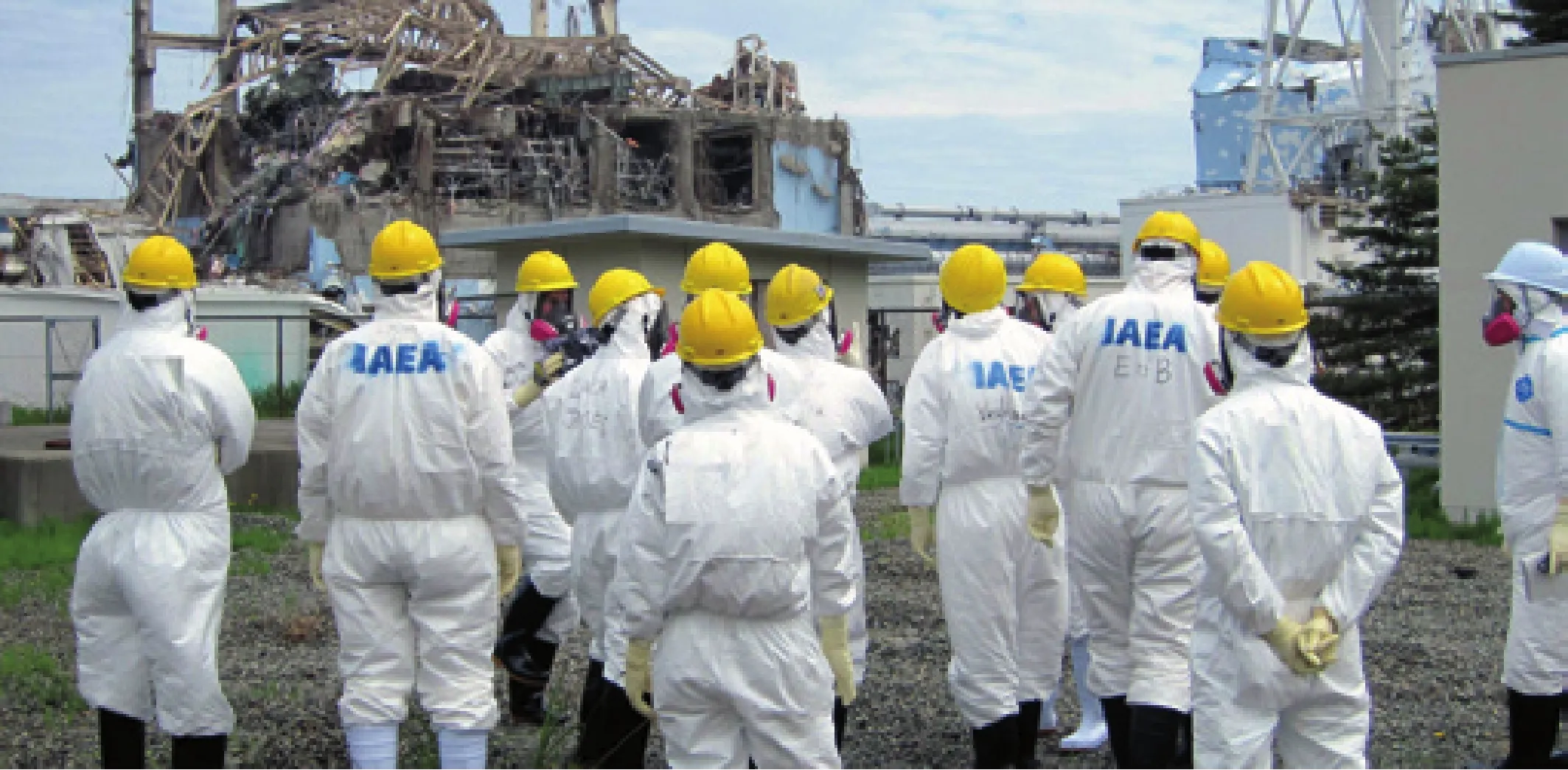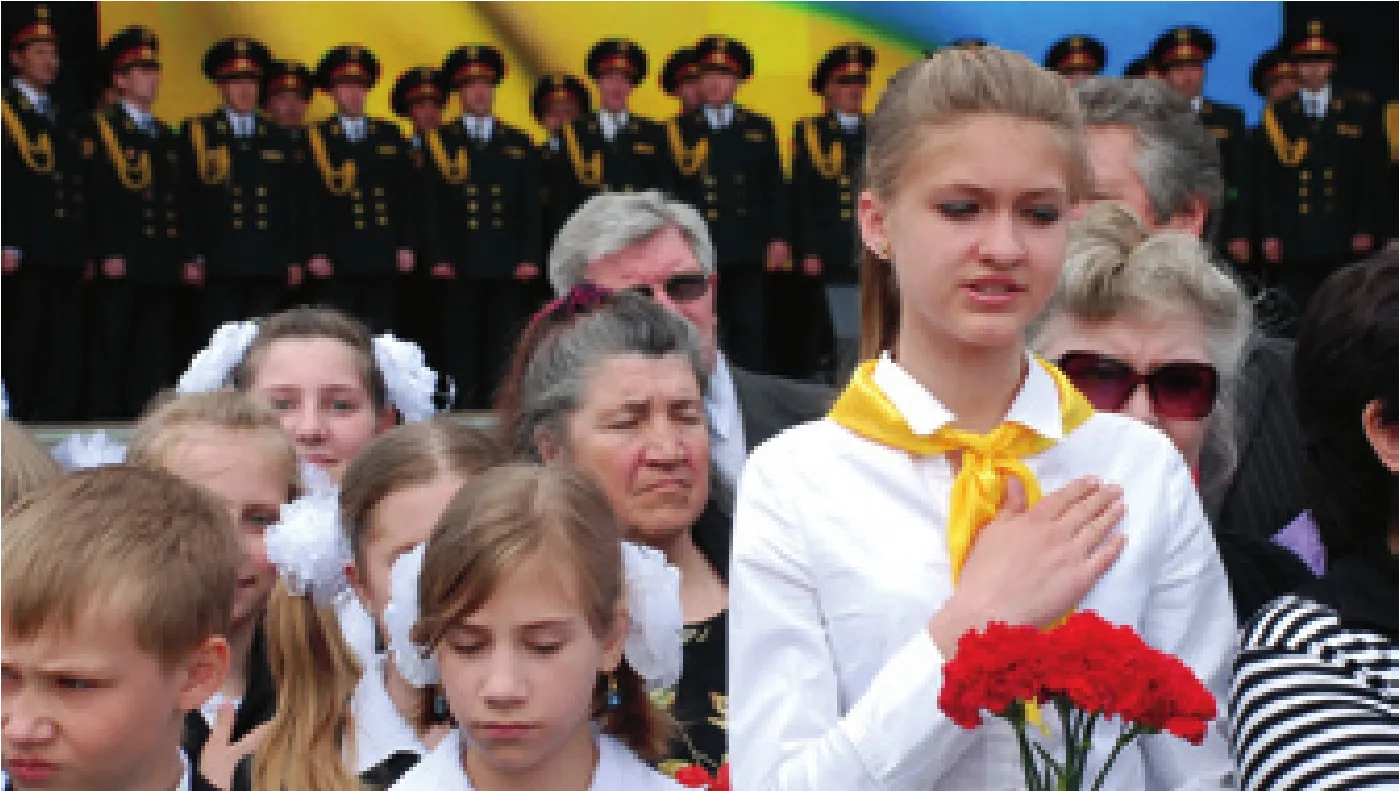Addressing Nuclear Security
2011-10-14ByZHANGLIANGUI
By ZHANG LIANGUI
Addressing Nuclear Security
By ZHANG LIANGUI

FACT FINDING: Nuclear experts from the International Atomic Energy Agency examine a damaged reactor at the Fukushima Daiichi Nuclear Power Plant on May 27
Nations should step up cooperation on establishing an international nuclear security system under the UN framework

Nuclear security has been on the agenda of many international conferences since a 9.0-magnitude earthquake in Japan caused severe radiation leaks at the Fukushima Daiichi Nuclear Power Plant in March. These conferences include the Fourth China-Japan-South Korea Leaders’ Meeting in Tokyo and the Group of Eight Summit in Deauville, France. Nuclear security has become a pressing concern for the international community.
Mounting risks
The world has never encountered a nuclear security challenge as severe as the current one since mankind learned to utilize nuclear power for peaceful and non-peaceful purposes in the 1940s. The challenge confronts us in multiple forms.
It first takes on the form of nuclear accidents. Statistics of the U.S.-based Nuclear Energy Institute show as of June 2011,29 countries worldwide are operating 440 nuclear reactors for electricity generation and 64 new nuclear plants are under construction in 15 countries. One consolation is that accidents of Level 1-7 on the International Nuclear Event Scale are exceedingly rare,but each accident that had occurred was astonishing in manifestation and each left a heartbreaking aftermath.
In the latest case of Fukushima, which hit Level 7, the highest level on the scale, no solutions have yet been found to address the disaster and it is almost certain areas within a 20-km radius of the plant will be uninhabitable.Furthermore, it will take several decades to fully observe damage to marine life.
A Greenpeace report in April 2006 said the world’s worst nuclear plant accident, the Chernobyl meltdown in April 1986, caused 270,000 cases of cancer, killing 93,000,while several million were exposed to elevated levels of radiation. Areas within a 30-km radius of the plant are deserted and wildlife species there have visibly mutated.This disaster has caused the contamination and abandonment of thousands of square kilometers of land in Ukraine, Belarus and Russia. Even 34 percent of land in Britain was polluted to varying degrees.
The growing proliferation of nuclear technologies is another severe challenge.Many nuclear materials and technologies were smuggled due to management slackness during the breakdown of the Soviet Union in the early 1990s. It was reported a recent terrorist attack on a Pakistani naval base on May 22 might be the rehearsal for a future attack on Pakistan’s nuclear arsenal,as the attack was only 24 km away from one of Pakistan’s nuclear weapons bases.
One British expert said terrorists had launched attacks on three of Pakistan’s nuclear facilities in the past fi ve years. If terrorists obtained nuclear weapons and took revenge for the death of Osama Bin Laden, it could result in a death toll of tens of millions around the world, said a Russian nuclearexpert. The Pakistani Taliban said on May 26 they had no plans to attack Pakistan’s nuclear arsenal, but the credibility of the statement is doubtful. As a result, U.S.forces are attempting to gain direct control over Pakistan’s nuclear weapons in case the Pakistani Government cannot guarantee their safety, which has made Islamabad nervous.
An international smuggling network of nuclear technologies and materials is active with the participation of individuals,groups and even governments. For instance,Pakistani nuclear scientist Abdul Qadeer Khan was kept under home arrest for years because of his alleged involvement in nuclear weapons proliferation.
In another case, it was reported a secret attack launched by Israel in September 2007 on a Syrian nuclear facility had caused deaths of 10 nuclear experts.
Nuclear tests are another concern. A few countries insist on developing nuclear weapons and carrying out nuclear tests in contravention of the UN’s Nuclear Non-Proliferation Treaty(NPT) and Comprehensive Nuclear-Test-Ban Treaty. India and Pakistan launched fi ve and six nuclear tests respectively in May 1998. North Korea proclaimed itself a nuclear power after it carried out two tests in October 2006 and May 2009.
It is even more worrisome North Korea has conducted nuclear tests in populous areas in Northeast Asia despite the fact all nuclear tests carried out by other nuclear powers were in deserts or on uninhabited Paci fi c islands. If a nuclear disaster occurs, the Korean Peninsula will be contaminated, leaving the Korean people nowhere to live, and its neighboring countries, China in particular,will suffer. North Korea’s test location was only dozens of kilometers away from its border with China.
No country should act on its own in the name of sovereignty on the nuclear issue,and the loss of certain sovereign rights is an inevitable cost of developing nuclear technologies
Working together
The harsh reality demands common sense on nuclear security: Nuclear accidents affect all of mankind, and nuclear security is not just a domestic issue, but a regional or global one. National sovereignty has its limits with respect to nuclear security.
We should put nuclear security before other economic and political interests, because the latter involves the short-term interests of certain people, but the former is relevant to the survival of a nation. No country should compel any other country to shoulder risks of nuclear accidents while using nuclear power for peaceful purposes, not to mention non-peaceful purposes.
A country has the right to make proposals, call for negotiations, and even request intervention from the UN Security Council when another country’s nuclear-related activities pose or are likely to pose threats to its environmental security. No country should act on its own in the name of sovereignty on the nuclear issue, and the loss of certain sovereign rights is an inevitable cost of developing nuclear technologies.
To safeguard mankind’s common interests, countries should step up cooperation on establishing an international nuclear security system under the UN framework. There are a few steps to take at present:
First, a reporting system for nuclear accidents should be established. This system calls on countries suffering nuclear accidents to report promptly, accurately and adequately on any progress in handling the accidents to neighboring countries, so they can take measures in a timely manner to reduce damages and prevent the disaster from escalating.
Second, in confronting nuclear disaster, all countries should share the spirit of helping and supporting each other. Once a nuclear accident occurs in one country, other countries should provide technical and material aid to the disaster-hit country to meet its needs. After the disaster is subdued, they should send experts to take joint efforts to conduct research, identify causes and find solutions for the effective prevention of such disasters in the future.
Third, guided by the UN, countries should strive to put in place an international nuclear disaster early warning mechanism.The UN should establish a special agency to monitor global nuclear safety, reporting on related developments promptly. Teams of professionals specializing in handling nuclear accidents should be set up, and technologies and equipment should be made ready for emergency calls.
Fourth, the international community should engage in extensive cooperation in using nuclear power safely for peaceful purposes under the framework of the NPT.Countries should establish a market for nuclear technologies to allow the sharing of these for the bene fi t of all. Those that don’t abide by the NPT should not be entitled to the sharing of nuclear technologies.
Fifth, a new agency should be created under the administration of the UN to manage nuclear-capable countries’ nuclear technologies, materials and equipment.The agency should be entrusted with the production, sales and supervision of nuclear materials and the recycling and disposal of nuclear wastes. In this way, it will help reduce occurrences of nuclear accidents in countries without sufficient technological guarantees, and prevent attempts to develop nuclear weapons in the name of using nuclear power for peaceful purposes.
Sixth, a system of stricter international supervision and punishment should be put in place. Comprehensive international legislation is needed to regulate the construction and management of nuclear facilities. For the sake of mankind’s common interest, the UN Security Council should adopt resolutions to punish countries violating nuclear security management stipulations.
The author is a professor with the Institute of International Strategic Studies of the Party School of the Central Committee of the Communist Party of China

REMEMBRANCE: Kiev residents attend a ceremony marking the 25th anniversary of the Chernobyl nuclear disaster on April 26
